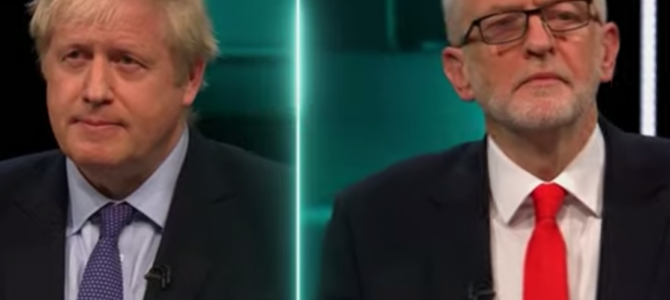
British debate moderators have the Bercow syndrome. John Bercow was the last speaker of the House of Commons who suffered from a sort of delusional Wodehouse-ian self-importance that made him perform verbose orotund circumlocutions.
While a normal debate moderator might say, “I think that’s not correct,” Bercow would probably say, “While this typically astute observation is characteristic of the great political acumen the honorable gentleman displays, on this point he suffers from a trivial but notable disadvantage — of being wrong.” Yes, it is amusing, I suppose, if you’re in an Oxford social club, but it gets exhausting with time. You wonder if it is all performative, or if this imbecile actually likes the sound of his own voice that much.
I sat to watch the unfortunate debate between British Prime Minister Boris Johnson and Labour leader Jeremy Corbyn with a carefully maintained English pessimism, but even with that Byronic attitude, it felt more disappointing than one could expect.
The moderator, Julie Etchingham, was annoying and schoolmarmish. The result was that no one could talk, there was no cross-questioning, there was no cross talk even between the contestants, and the interruptions were nearly endless. What was the point of that? No one watches a debate to hear the moderator pondering about the meaning of life.
The debate was predicated between one (quite literally) gigantic presence who is never comfortable with a short monosyllabic answer, and one Marxist geography teacher lookalike who would rather tend his Junipers and wax nostalgic about Cuban soldiers battling imperialists in Angola in the ’70s.
We Live in Polarized Times
The debate started with a handshake between the two contestants, signifying bringing propriety and civility back into politics, which, even though a bit effete for stoic Brits, was a good touch. We could all do with a bit of civility in politics. Until, of course, Corbyn (or Bernie Sanders) wins and starts confiscating properties from billionaires, which leads to shutting of business and capital flow and base relocations to offshore heavens such as Singapore, leading to thousands of job losses and riots. If you think that’s a fetch too far, you haven’t guessed what’s in store.
Johnson took every opportunity to say Corbyn has no Brexit plan, and thus his is the only plan on the table. That is objectively true. The third-largest party, the Liberal Democrats, who did not cross the threshold of the debate, at least had a plan of stopping Brexit. They are quite open about it. The clue is in their slogan, “Stop Brexit.”
The Conservatives, on the other hand, are slowly lining up behind Johnson and his deal. The one who has so far played both sides and hedged is Labour leader Corbyn. He never mentioned how he will get out of this three and a half years of live-action Hieronymus Bosch-designed purgatory called Brexit.
Unfortunately, whenever Johnson wanted to get on his Periclean flow, the moderator would cut him off and then proceed to ask Corbyn about something inane. You think there’s liberal bias in American media? Allow me to introduce you to an island next to the English Channel.
The biggest point of the debate was about National Health Service, or NHS. Regardless of its overall problems and incompetence, it remains deeply popular in the U.K. Unfortunately, in recent years a repeated rumor has circulated that NHS would be “on the table” in any future trade deal with the United States. It is absurd, needless to mention. American companies can already apply for private contracts.
Other than that, it is frankly mindless to imagine that American taxpayers would be willing to buy NHS and subsidize the British government-provided health service. Yet this conspiracy theory continues to haunt the British left.
Johnson had one shot to clear it up, which he duly did. The NHS will never be up for sale, he thundered. That would ideally take away the one issue arrow from Corbyn’s quiver. But we live in polarized times. Whether this even will reach to closed leftist ears is a matter of significant doubt.
Britain Won’t Debate the Important Things
Other than that, this was a Brexit debate, with both candidates trying to voice their opinion about why Brexit is the only issue ahead of the country and the moderator stopping them both for some reason. Corbyn wasn’t grilled much on antisemitism among the pro-Palestinian factions and demographics of the Labour Party.
An awkward audience question concerned monarchy, the most popular institution in the country, which both candidates wanted to avoid answering. A single question explored Prince Andrew and Jeffrey Epstein (probably never going to happen in any U.S. debate, to be fair). I was half expecting someone to shout, “Epstein didn’t kill himself.”
There was no significant debate about crime in London, which has reached a proportion hitherto unknown in the civilized world. The type of homelessness, addiction, and crime one can see in London would make some parts of California proud.
Most of the criminals as well as the addicted homeless are native born. It is bizarre that in a country where jobs go unfilled by the local labor force, thousands of able-bodied drug addicts are doing nothing in London. The math doesn’t add up. At the time of writing, for example, jobs from farming to caregiving go unfilled in Scotland. Why do we have thousands of homeless dependents on social services in London? Your guess is as good as mine.
Not much discussion probed the greater questions of grand strategy. What would Britain do as the world gets divided between the United States, China, and Russia, with the EU trying to hedge among all three? How would Britain respond to the Hong Kong Rubicon moment? Will Hong Kongers who were British citizens until 1997 be given asylum? That would mean a couple million highly motivated, educated, and genuinely pro-Western new citizens — an idea with broad support among the British electorate as well as major swaths of Conservatives, but a catastrophe for the Labour Party.
What about the once-mighty Royal Navy, which is now struggling to form escort groups to guard its own carriers? Will Britain’s much-vaunted pivot to “east of Suez” continue alongside the Americans? Or is Britain going to be preoccupied with stalling a Emmanuel Macron-led European army and the eventual disintegration of the North Atlantic Treaty Organization?
This is a fundamentally unserious great power, formerly known as Great Britain, which despite being within the top 10 in every measurable ranking of military, economy, and technology has somehow lost the idea of what it means to be British and lost the pride in its own history. The result was this clown show, “full of sound and fury, signifying nothing.” The only grace was the audience laughter at both these leaders. At least the islanders haven’t forgotten to laugh, even at the face of adversarial uncertainty.







